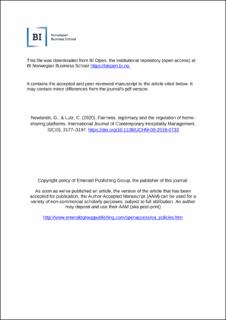| dc.contributor.author | Newlands, Gemma Elisabeth Marjorie | |
| dc.contributor.author | Lutz, Christoph | |
| dc.date.accessioned | 2021-06-15T10:51:56Z | |
| dc.date.available | 2021-06-15T10:51:56Z | |
| dc.date.created | 2020-08-14T10:54:31Z | |
| dc.date.issued | 2020 | |
| dc.identifier.citation | International Journal of Contemporary Hospitality Management. 2020. Vol. 32 No. 10, pp. 3177-3197 | en_US |
| dc.identifier.issn | 0959-6119 | |
| dc.identifier.uri | https://hdl.handle.net/11250/2759525 | |
| dc.description.abstract | Purpose – The purpose of this study is to contribute to current hospitality and tourism research on the sharing economy by studying the under-researched aspects of regulatory desirability, moral legitimacy, and fairness in the context of home-sharing platforms (e.g., Airbnb). Design/methodology/approach – Three separate 2x1 between-subjects experimental vignette surveys are used to test the effects of three types of fairness (procedural, interpersonal, informational) on two outcomes: moral legitimacy and regulatory desirability. Findings – The results of the research show that high perceived fairness across all three types increases moral legitimacy and reduces regulatory desirability. Respondents who perceive a fictional home-sharing platform to be fair consider it to be more legitimate and want it to be less regulated. Research limitations/implications – Following established practices and reducing external validity, the study uses a fictional scenario and a fictional company for the experimental vignette. The data collection took place in the United Kingdom, prohibiting cultural comparisons. Practical implications – The research is useful for home-sharing platform managers by showing how they can boost moral legitimacy and decrease regulatory desirability through a strong focus on fairness. It can also help policymakers and consumer protection advocates by providing evidence about regulatory desirability and how it is affected by fairness perceptions. Originality/value – The article adds to hospitality and tourism research by offering theoretically meaningful and practically relevant conclusions about the importance of fairness in driving stakeholder opinions about home-sharing platforms. | en_US |
| dc.language.iso | eng | en_US |
| dc.publisher | Emerald | en_US |
| dc.subject | Sharing economy | en_US |
| dc.subject | Fairness | en_US |
| dc.subject | Regulation | en_US |
| dc.subject | Legitimacy | en_US |
| dc.subject | Ride-hailing | en_US |
| dc.subject | Home-sharing | en_US |
| dc.title | Fairness, Legitimacy, and the Regulation of Home-Sharing Platforms | en_US |
| dc.type | Journal article | en_US |
| dc.type | Peer reviewed | en_US |
| dc.description.version | acceptedVersion | en_US |
| dc.source.pagenumber | 3177-3197 | en_US |
| dc.source.volume | 32 | en_US |
| dc.source.journal | International Journal of Contemporary Hospitality Management | en_US |
| dc.source.issue | 10 | en_US |
| dc.identifier.doi | 10.1108/IJCHM-08-2019-0733 | |
| dc.identifier.cristin | 1823313 | |
| dc.relation.project | Norges forskningsråd: 275347 | en_US |
| cristin.ispublished | true | |
| cristin.fulltext | postprint | |
| cristin.qualitycode | 1 | |
